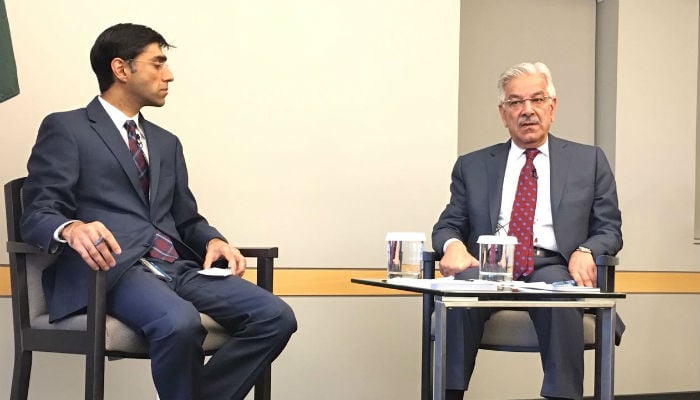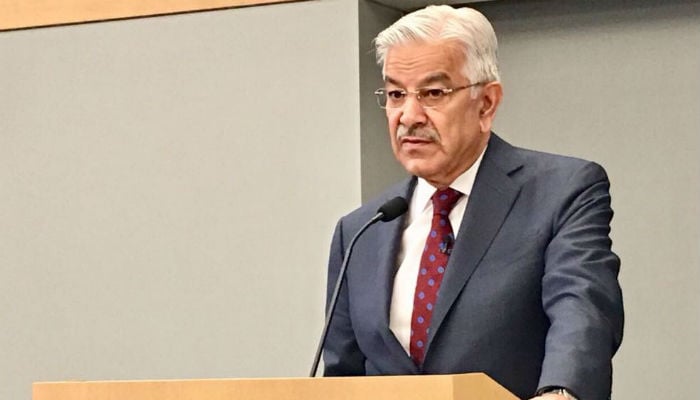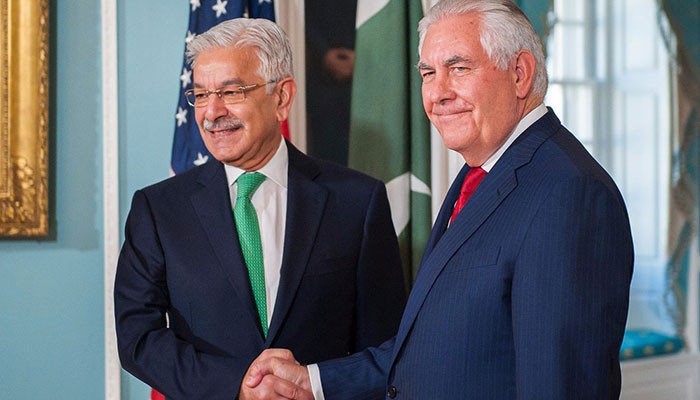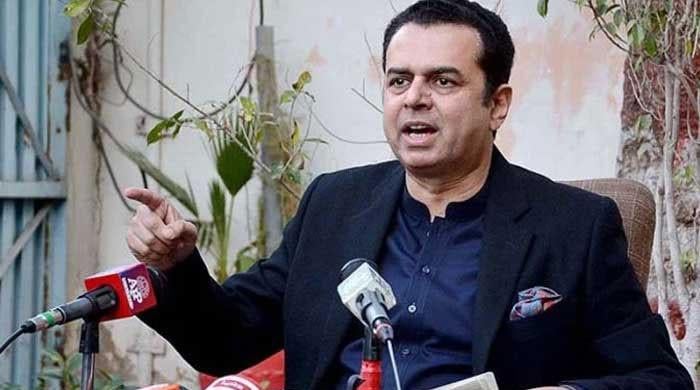Trust deficit exists in Pak-US relations, says Khawaja Asif
Pakistan only victor in the war against terrorism, says foreign minister while speaking at USIP
October 05, 2017
WASHINGTON: Foreign Minister Khawaja Asif said on Thursday that Pakistan feels there is trust deficit in its relations with the United States.
"Yes, there is a trust deficit," he said while speaking at the United States Institute of Peace during his three-day tour of US.
While in conversation with Moeed Yusuf, director of South Asia programmes at USIP, Asif said that "we are living in hell" because of the decision to participate in the US fight against the Soviet Union.
"While US soldiers went back chest thumping that they have defeated the Soviet Union, no one cared about what happened to Pakistan," said the minister who is known for his candour.
He said that about 3.5 million refugees are living in Pakistan. "We have every kind of friction, religious, ethnic and political intolerance. This is the baggage we carry from the 80s."
Over the Vegas shooting, he said Pakistan is deeply saddened by the incident and stressed that it should be called an act of terror. "Why call it shooting, call it terrorism. This is terrorism in all its forms and manifestations."
"These contradictions will be counterproductive," he added.
The foreign minister also said that "Pakistan is the only victor in the war against terrorism" as the country faced the threat head-on.

"Since 2014, we have wiped them [terrorists] out," he said, stressing that "our achievements are better than any other country's. It occurred due to the commitment of 200,000 soldiers."
"We don't want any material help from US, all we want is respect."
Asif said Pakistan is hoping for peace in Afghanistan.
"Ensuring security in Afghanistan is critical for the [South Asian] region," he remarked. "We will be the biggest beneficiary of peace in Afghanistan."
"Burden of a 16-year-long war in Afghanistan has now passed to a new Afghanistan," he said. "For Pakistan the timeline of managing the fallout of Afghanistan's instability is 30 years and still counting. This is more than half of our life as an independent country."
It is the responsibility of all parties to initiate a political process, he said, adding that Pakistan seeks "productive relations" with Afghanistan which include the elimination of safe havens in Afghanistan and border management.
Pakistan feels that US and Pakistan must actively work towards peace in South Asia, he added.
Thanking USIP for the invitation, he remarked that the current world is full of "chronic challenges" such as long wars, climate change, under development, global migration and rising intolerance and extremism along with the global menace of terrorism, which claims hundreds of lives every year.
"I am honoured to represent a country that is overcoming challenges of disarray and wishes to build a partnership for a secure and prosperous future," he said, adding that "terrorism is being rigorously battled" in the country.
"Lately, there has been a tendency to place Pakistan's counterterrorism credentials under focus. The truth is that Pakistan is not just fighting but also winning against terrorism," he pointed out.
"Four years ago, Pakistan had one of the highest incidences of terrorism anywhere in the world. Pakistan responded to this tide of terrorism by building a strategic national consensus on a comprehensive counterterrorism strategy."
"Our troops have bravely soldiered in terrain that has deceived visitors for centuries. What is often forgotten is that Pakistan has been conducting a series of major counter-terrorism operations for over a decade and has progressively secured all territory on its side of the border."
Pakistan’s successes in the fight against terrorism have come at a staggering human and financial cost, he pointed out, adding that it has resulted in over 62,000 casualties, over $120 billion in economic costs over 16 years and with large-scale deployment of security personnel for counter-terrorism.
“From thousands of nameless Pakistanis to kids like the 17 years old Malala Yousufzai, the Nobel laureate and 15 years old Aitzaz Hassan, the school boy who died while protecting his class fellows - to the 22 years old Lt Arsalan Alam who was martyred last month by terrorists attacking from Afghanistan - we have a long list of heroes in every town,” the foreign minister said.

He also said that Pakistan requires recognition, by both Pakistan and US, of each other's sacrifices in the war against terrorism. "We will continue to work for peace and stability."
Asif also spoke about the plight of people in Kashmir during his address. "Kashmiris have faced all forms and manifestations of state-sponsored terrorism."
"The plight of Kashmiris in Indian occupied Kashmir cannot be ignored by the international community. As the time has passed the brutality of Indian security forces has increased and the civility of Indian occupation has diminished," he said.
In the interest of peace, Pakistan can normalise relations with India, he said. However, "normalisation requires that India stops its support to terrorism in Pakistan and agrees to hold unconditional dialogue on all matters of mutual concern including the core issue of Jammu and Kashmir."
Pakistan critical for long-term stability of South Asia
Khawaja Asif, who is currently visiting Washington for a three-day tour, met with US Secretary of State Rex Tillerson on Wednesday.
Addressing the media after the meeting, Tillerson remarked that Pakistan is critical for the long-term stability of South Asia.
"Not just Afghanistan, but it is the importance of Pakistan and Pakistan's long-term stability as well," he remarked while speaking about US's policy towards South Asia.
"We want Pakistan's government to be stable, peaceful.. many of the same issues they are struggling inside Pakistan are our issues. So we think there is an opportunity to strengthen that relationship."
Pakistan's relation with the US is "extraordinarily important", he said.











